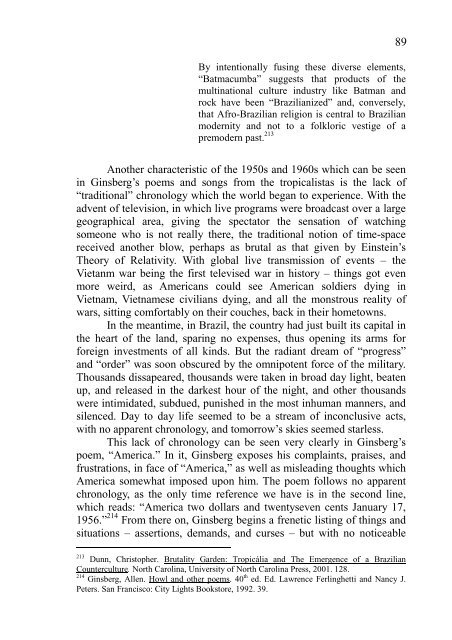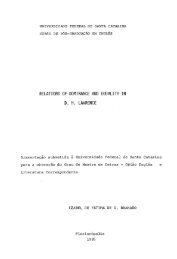Tropical ginsberg
Tropical ginsberg
Tropical ginsberg
Create successful ePaper yourself
Turn your PDF publications into a flip-book with our unique Google optimized e-Paper software.
89<br />
By intentionally fusing these diverse elements,<br />
“Batmacumba” suggests that products of the<br />
multinational culture industry like Batman and<br />
rock have been “Brazilianized” and, conversely,<br />
that Afro-Brazilian religion is central to Brazilian<br />
modernity and not to a folkloric vestige of a<br />
premodern past. 213<br />
Another characteristic of the 1950s and 1960s which can be seen<br />
in Ginsberg’s poems and songs from the tropicalistas is the lack of<br />
“traditional” chronology which the world began to experience. With the<br />
advent of television, in which live programs were broadcast over a large<br />
geographical area, giving the spectator the sensation of watching<br />
someone who is not really there, the traditional notion of time-space<br />
received another blow, perhaps as brutal as that given by Einstein’s<br />
Theory of Relativity. With global live transmission of events – the<br />
Vietanm war being the first televised war in history – things got even<br />
more weird, as Americans could see American soldiers dying in<br />
Vietnam, Vietnamese civilians dying, and all the monstrous reality of<br />
wars, sitting comfortably on their couches, back in their hometowns.<br />
In the meantime, in Brazil, the country had just built its capital in<br />
the heart of the land, sparing no expenses, thus opening its arms for<br />
foreign investments of all kinds. But the radiant dream of “progress”<br />
and “order” was soon obscured by the omnipotent force of the military.<br />
Thousands dissapeared, thousands were taken in broad day light, beaten<br />
up, and released in the darkest hour of the night, and other thousands<br />
were intimidated, subdued, punished in the most inhuman manners, and<br />
silenced. Day to day life seemed to be a stream of inconclusive acts,<br />
with no apparent chronology, and tomorrow’s skies seemed starless.<br />
This lack of chronology can be seen very clearly in Ginsberg’s<br />
poem, “America.” In it, Ginsberg exposes his complaints, praises, and<br />
frustrations, in face of “America,” as well as misleading thoughts which<br />
America somewhat imposed upon him. The poem follows no apparent<br />
chronology, as the only time reference we have is in the second line,<br />
which reads: “America two dollars and twentyseven cents January 17,<br />
1956.” 214 From there on, Ginsberg begins a frenetic listing of things and<br />
situations – assertions, demands, and curses – but with no noticeable<br />
213 Dunn, Christopher. Brutality Garden: Tropicália and The Emergence of a Brazilian<br />
Counterculture. North Carolina, University of North Carolina Press, 2001. 128.<br />
214 Ginsberg, Allen. Howl and other poems. 40 th ed. Ed. Lawrence Ferlinghetti and Nancy J.<br />
Peters. San Francisco: City Lights Bookstore, 1992. 39.

















